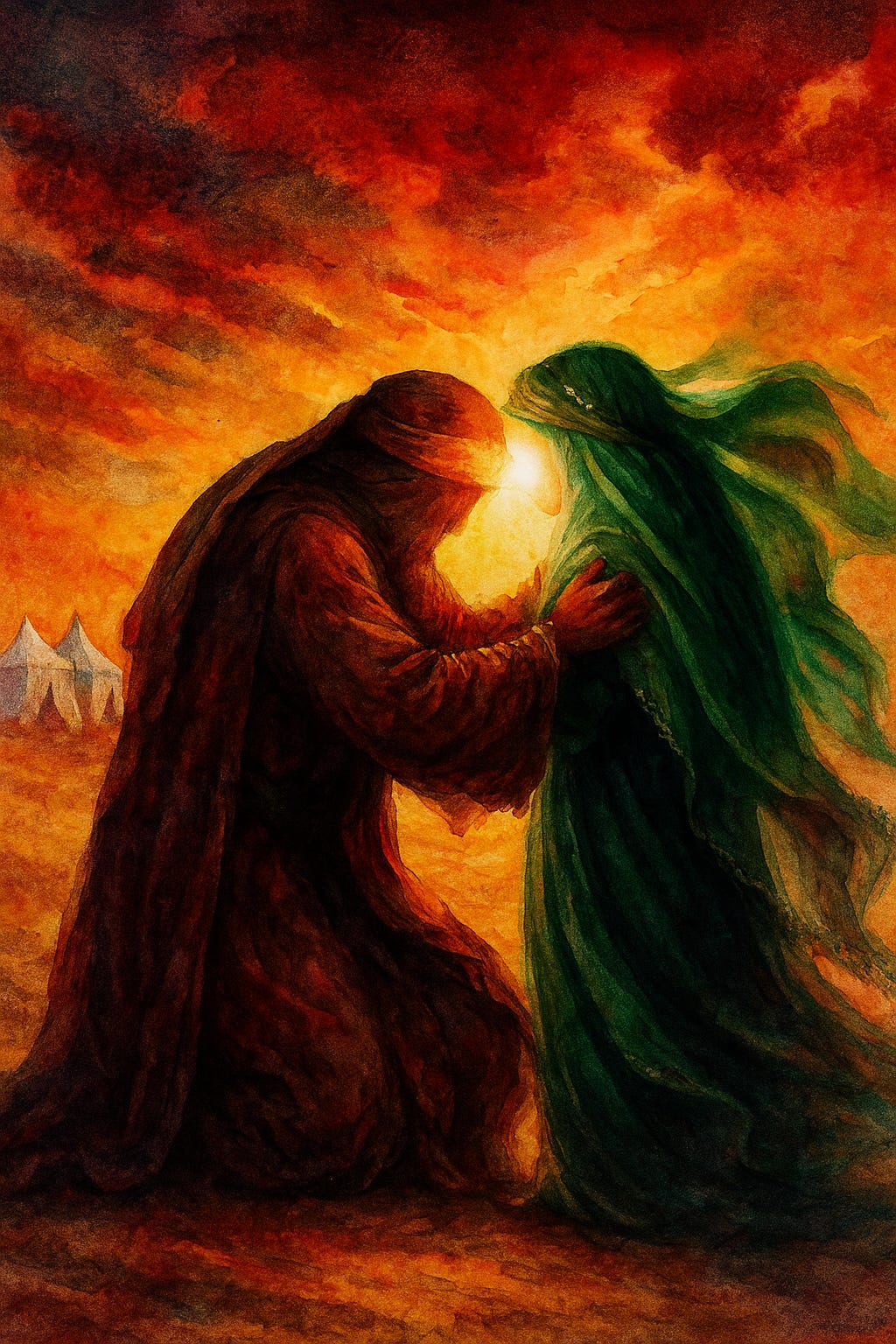The Final Farewell of Hussain ibn Ali (AS)
A Legacy of Honour, Sacrifice, and Immortal Love
On the scorching plains of Karbala, on the 10th day of Muharram, 61 AH, history witnessed a scene unmatched in its depth of love, tragedy, and resilience. It was the final farewell of Imam Hussain ibn Ali (AS), the grandson of the Prophet Muhammad (PBUH), to his family — a moment that would forever echo in the hearts of generations.
By this time, the battle had claimed every single one of his loyal companions and family members, except for his son, Imam Ali Zayn al-Abideen (AS), who was severely ill and unable to fight. The camp of the Ahlul Bayt had fallen silent, pierced only by the cries of women and children who now realized that the Imam was preparing for his final stand.
The Farewell to His Family
Imam Hussain (AS) entered the tent, his face marked by both grief and divine determination. He gathered his beloved family — his sisters Lady Zaynab (AS) and Umme Kulthum (AS), his wives including Rabab (AS) and Umme Layla (AS), his daughters Fatima, Ruqayya, Sakina, and his servant Fizza (AS).
With a voice heavy with love and sorrow, he addressed them:
“O Zaynab, O Umme Kulthum, O Fatima, O Ruqayya, O Rabab, O Umme Layla, O my daughter Sakina, O Fizza — my last salaams upon you all.”
The tent was filled with uncontrollable weeping. Lady Zaynab (AS), remembering the words of her mother Fatimah Zahra (SA), approached her brother and lovingly kissed his neck — the very place where the merciless sword would soon strike.
Imam Hussain (AS) embraced her with trembling hands, kissed her arms, and whispered:
“My precious sister Zaynab, take care of my Sakina. She is only a child. She will miss me the most when I am gone. I entrust her to you.”
The Visit to His Ill Son
The Imam then went to the tent of his son, Imam Zayn al-Abideen (AS), who lay ill on his bedding. Gently waking him, the Imam whispered:
“My son, I am going to the battlefield. I entrust the Imamate to you after me. You are the next Imam. Look after the women and children.”
When Imam Sajjad (AS) opened his weak eyes, he immediately asked in agony:
“Father, where is Uncle Abbas? Where is Ali Akbar? Where are Aun and Muhammad? Where are all our companions?”
Imam Hussain (AS) responded with broken words:
“My son, all of them have been martyred. There is no one left except you and me. But you are too sick to fight. You must survive to carry this message.”
A Message to His Followers
Before leaving, Imam Hussain (AS) left a will for his followers, as recorded in the traditions:
“O my son, when you return to Medina, convey my salaams to my Shias. Tell them that I remembered them on the day of Ashura. Tell them — whenever you drink water, remember me and my thirst. And whenever you hear of an oppressed person, remember my suffering.”
The Lonely Warrior — Mounting His Horse
Imam Hussain (AS) then stepped out of the tent to prepare for his last ride. His eyes scanned the battlefield and sighed:
“Where are my supporters? Where are my companions? Who is left to help the grandson of the Prophet?”
In every case that day, Imam Hussain (AS) had personally helped his companions mount their horses for battle. But now, there was no one to help him.
Seeing this, Lady Zaynab (AS), with a heart torn between agony and courage, stepped forward. Her trembling hands helped her brother mount his horse for the final time.
Sakina's Last Plea
As the Imam urged his horse forward, the animal refused to move. It looked down in sadness. Imam Hussain (AS) turned and saw a heart-wrenching sight: his young daughter Sakina (AS) had clung to the horse’s legs.
He dismounted, picked her up, and held her close. Her small arms wrapped tightly around his neck as she sobbed:
“Father, don’t go! Who will put me to sleep at night? Who will hold me when I cry? How will I live without you?”
Imam Hussain (AS), with tears streaming down his blessed face, replied:
“O my dear Sakina, my heart breaks for you. But remember, you are the granddaughter of Fatima Zahra (SA). Be patient, my beloved. If I don’t sacrifice myself, Islam will perish. This is the path of honour.”
He placed her hand in Lady Zaynab’s (AS) and said:
“My sister, my Sakina is now yours. Look after her. Shield her from the cruel aftermath.”
A Stand for Eternal Honour
As the Imam mounted his horse, he turned one final time toward the tents. His gaze lingered on the faces he loved — faces that bore the light of Prophethood. He knew that after his martyrdom, the tragedy would continue in captivity, but their patience and dignity would shake the very thrones of oppression.
He raised his voice, calling out:
“If you do not have any religion and do not fear the Day of Judgment, then at least be free in your worldly affairs!” (Bihar al-Anwar, vol. 45, p. 51)
And as he rode toward his martyrdom, he declared the timeless principle:
“Death with dignity is better than a life of humiliation.”
Legacy of Karbala
The scene of Imam Hussain’s farewell encapsulates the very essence of Karbala — a lesson that transcends time. It is a message for every soul oppressed, every heart burdened, and every seeker of truth:
"Stand for what is right, even if it costs your life. Dignity is eternal; humiliation is a living death."
The tragedy of Karbala was not merely a historical event — it was, and remains, a divine manifesto of resistance, honour, love, and ultimate sacrifice.
📚 References:
Bihar al-Anwar, vol. 44-45, by Allama Majlisi (Shia source)
Luhuf, by Sayyid Ibn Tawus
Maqtal al-Hussain, by Abu Mikhnaf
Kamil al-Ziyarat, by Ibn Qulawayh


